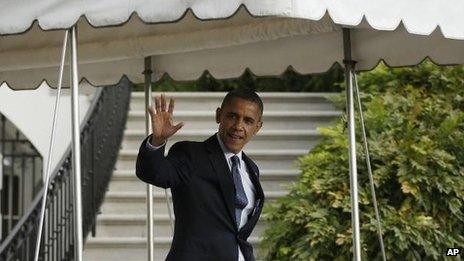Barack Obama makes few promises in 2012 campaign
- Published
- comments

Mitt Romney has been quick to pick on something the American press has just decided is a story, even though it has been obvious for a long while. President Obama doesn't have a manifesto - and it is not clear what he would do if he wins another term in the White House.
Mitt Romney doesn't have a manifesto either, and there are many questions his plans don't answer (more on this later in the week).
But President Obama is in a different league. The question is whether this is campaign style, or a lack of substance.
This is the first of the very many elections I have covered, in Britain and Europe, where the person in power doesn't make some firm promises about exciting new stuff they would do if they win again.
It's not that President Obama hasn't said what he'd do, or that there's absolutely nothing new - it's just that what he is highlighting in speeches has the feeling of "keeping on, carrying on". It gives the campaign a quite different feel to that in 2008 when the suggestion was America was on the edge of a sparkling new future filled with possibility.
This campaign is more like an interval in which the audiences get to vote on whether the play continues, a halt midway through a long trudge to the promised land. And the prophet isn't going on too much about milk and honey, merely exhorting his followers not to break off now and go backwards with the other guy.
One reason it's difficult for President Obama to shout new ideas from the rooftops is that it is easy for the spectators below to point out that he's spent 18 months blaming the Republicans from stopping him doing anything. They dominate the House of Representatives and as nobody seriously thinks the Democrats are going to regain control in the election, any second-term agenda looks a lot like wishful thinking.
Still, if he wins, he would undoubtedly have some moral authority to bully them into negotiations, and a huge amount of the politics of a second term would centre around that battle.
Dig a little and it is possible to unearth some proposals - although not much detail.
Mr Obama has said he would create a million new manufacturing jobs by 2016 by encouraging trade deals, and create 100,000 new teaching jobs. He'd help students pay for college.
He wants extensive reform of America's over-complex and confusing tax system. In part, he would do this to cut America's debt - letting tax breaks for the well-off expire and making sure no-one earning a million dollars is on a lower rate than the average. He would get rid of what he says are tax breaks for companies moving jobs and profits out of America.
He'd make a new effort to get Congress to pass his American Jobs Act - cutting the equivalent of national insurance, giving tax breaks to companies hiring new workers, investing in new school buildings and a $50bn (£31bn) investment in infrastructure.
He says he has a "deep commitment " to reforming America's broken immigration system - but it's not clear how tough, or tender, he would be towards the millions of illegal immigrants already in the USA.
The president's campaign is really based on the idea that if he wins, he will go on making progress; if he loses, America will, in his terms, move backwards. An easy example is his healthcare reform: it is the law of the land now but the core of it won't have an impact until 2014 - and it will be scrapped if Mitt Romney is victorious.
On the one hand, there is a refreshing candour in a politician admitting what is often the truth - what you've seen is what you'll get - and African-Americans in particular are open to the idea that progress is a slow painful slog best stripped of fancy gimmicks.
But as a slogan, "re-elect me for more of the things that you aren't sure have worked yet" lacks a certain zing.